'I kept on racing because of the ban' – Davide Rebellin's three decades in pro cycling
Retiring 51-year-old Italian on a career divided by the fall
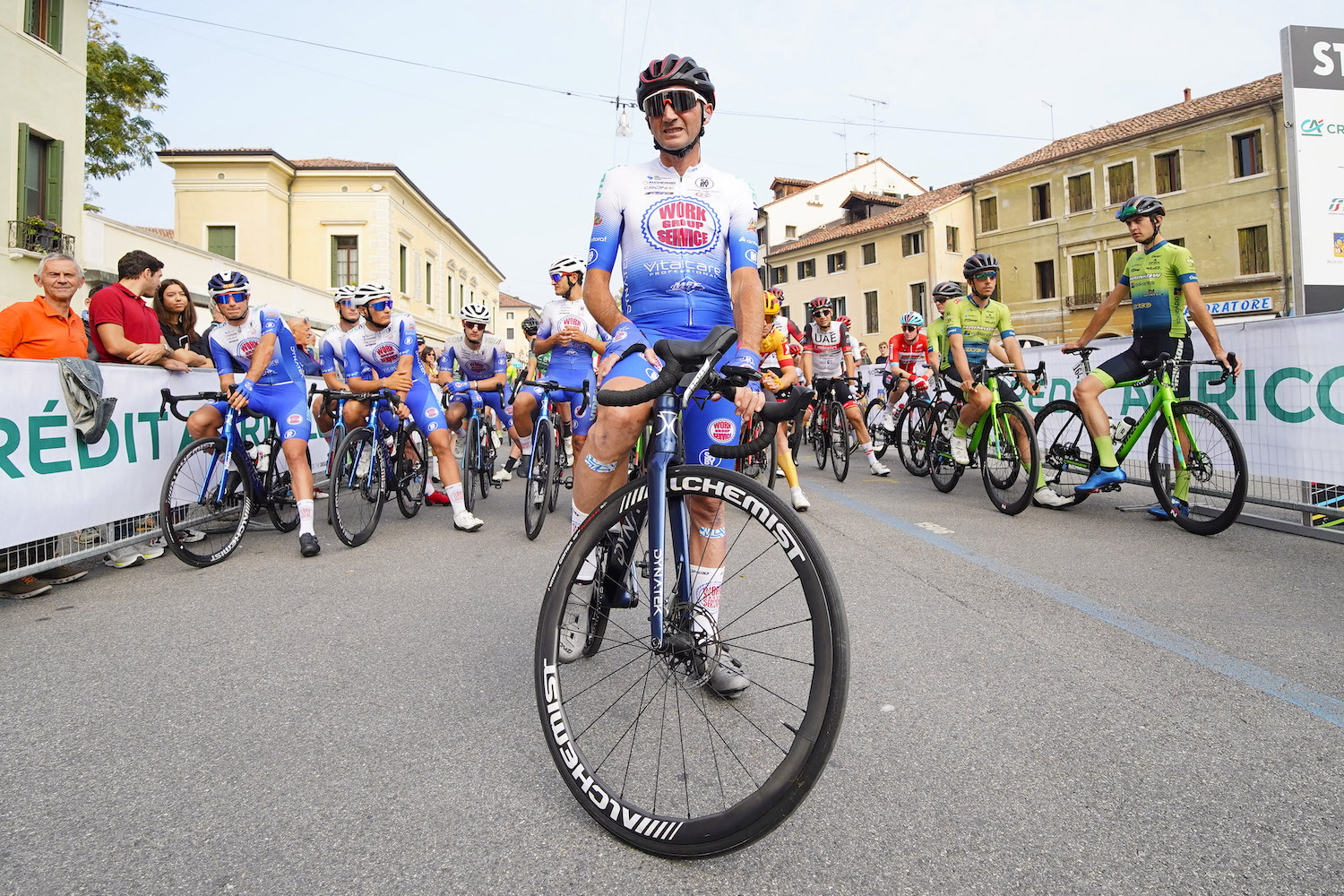
There wasn’t much by way of pomp or ceremony, but the occasion was marked all the same. Shortly before the Veneto Classic got underway on Sunday morning, Davide Rebellin was ushered into a spot a couple of metres ahead of the rest of the peloton and he stood there for a minute or so wearing an uneasy smile. The shyness of earlier years may no longer possess him, but it never really left him.
The dance music blaring over the public address system was eventually turned down a notch or so, and the speaker informed the sparse crowds on Treviso’s Piazza Matteotti that this would be the last race of Rebellin’s 30-year career as a professional cyclist.
A smattering of applause broke out on the roadside for the retiring local rider and rippled gently through the bunch, though it wasn’t clear if all the young men lining up behind Rebellin had even heard the speaker’s brief invocation.
Only 20 of the 112-strong peloton had even been born when Rebellin made his professional debut at the GP Camaiore in the faraway summer of 1992. Most won’t have seen his Classic wins in the distant noughties. Many won’t even remember the fall that followed his positive test for CERA at the 2008 Olympics.
Yet, at 51 years of age, he was somehow still there.
A photographer drew in to capture the moment, as Rebellin stood alone, on the threshold of the peloton but not quite a part of it. The applause petered out, and the speaker turned her attention towards counting down excitedly to the start of the race. On zero, the bunch moved off gingerly, and Rebellin faded discreetly back into it.
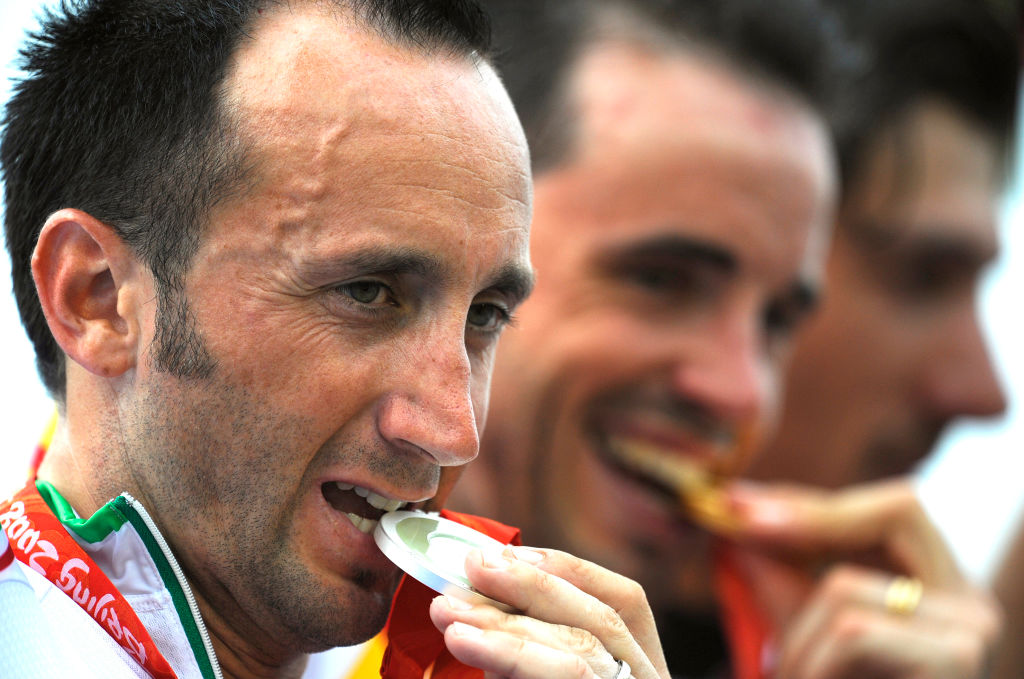
For much of the past decade, Rebellin has been racing for teams on shoestring budgets in events nestled near the base of the professional cycling pyramid. Every now and then, he would hint that the next season might be his last, but come the turn of the year, he would invariably be pictured in yet another new kit, promoting the wares of another obscure sponsor from Italy, Croatia and Kuwait, ready for another campaign that would take him along roads both known and unknown.
Get The Leadout Newsletter
The latest race content, interviews, features, reviews and expert buying guides, direct to your inbox!
The question is obvious. Why do it? Why keep racing past your 50th birthday for an almost derisory wage?
The answer is obvious, too, and Rebellin doesn’t try to pretend otherwise. Unlike Alejandro Valverde, another recent retiree whose career was bifurcated by a doping ban, mention of the scarlet letter is far from verboten.
Indeed, when Rebellin picks up the phone on the evening before his final race, he swiftly brings it up himself. At times, Valverde and his acolytes seem almost to pretend his suspension for blood doping never happened. For Rebellin, by contrast, the ban informs everything that has happened to him since.
“I kept on racing for so many years partly because of that ban that I had from the Olympic Games, where I was out for two years,” Rebellin tells Cyclingnews. “I wanted to come back, and I was hoping to race for a big team and do the Classics, and maybe end my career by winning another big race like Flèche or Liège.
“But after my suspension, I had a lot of doors closed in my face by teams. I couldn’t get back into a big team and that was maybe also why I extended my career. I wasn’t able to go out in a big team, but I kept on going."
Beijing
When Rebellin took silver behind Samuel Sanchez – himself banned for doping almost a decade later – in the road race at the 2008 Beijing Olympics, he billed it as “a medal for clean cycling”. It was a bold claim to make, preposterous even, not least because his Gerolsteiner team was about to implode amid a series of doping cases. That summer, a series of riders from Italy and elsewhere had been snared by a new test for CERA, and rumours persisted that many more samples were deemed to be suspect.
The following Spring, just days after Rebellin had won Flèche Wallonne for the third time, whispers began to amplify about the reanalysis of samples from Beijing. Names were circulating. One in particular. Even before the news was officially confirmed by the Italian Olympic Committee, everybody already knew. Rebellin had tested positive for CERA, like his Gerolsteiner teammate Stefan Schumacher.
I didn’t get the Olympic medal back but I still feel like it's mine
Rather than confess, Rebellin denied all wrongdoing, a stance from which he has never deviated. A two-year ban was handed down and he was later stripped of his silver medal, which was passed on to Fabian Cancellara at a ceremony in Switzerland in December 2010, with Alexander Kolobnev inheriting bronze. All the while, Rebellin was serving out his suspension, still training each day, labouring under the illusion that it might yet be overturned.
“I was incredulous. For a long time, I couldn’t believe this was happening,” Rebellin says of the moment he had to pack up his medal and send it back to the IOC to be assigned to Cancellara. “I always thought an error had been made and I always kept training as though I would be able to start again the next day.”
He would later avoid a criminal prosecution for doping in Italy, but the sporting verdict was both clear and binding.
“I was cleared by the Italian justice system, but I didn’t get the Olympic medal back,” Rebellin says. “But for me, it’s like I still have it. Even if I don’t have it physically, I feel like it’s still mine.”
The class of '92
The Olympics were already a part of Rebellin’s origin story. Ahead of Barcelona 1992, when cycling events were still reserved for amateurs, the Italian federation placed a moratorium on its young riders turning professional until after the Games. When Rebellin made his delayed professional debut with GB-MG at the GP Camaiore that August, Marco Pantani was a fellow neophyte in the gruppo.
Italian cycling’s Class of ’92 would also include Michele Bartoli, Francesco Casagrande and the Olympic champion Fabio Casartelli, and Rebellin initially struggled to keep pace with his contemporaries. “Compared to the others, I had some difficulties getting results,” Rebellin says. “Maybe it was a bit because of my character: I was very timid and shy, and I struggled to find the right feeling with the team."
The breakout performance came with Polti at the 1996 Giro d’Italia, where Rebellin won atop Monte Sirino and wore pink for six days en route to 6th overall in Milan. 7th place at the Vuelta a España suggested a Grand Tour man in the making, prompting Marc Madiot to sign Rebellin to lead his nascent La Française des Jeux squad’s Tour de France challenge. The union was an unhappy one.
“At the Tour, I was finishing mountain stages with the sprinters, and from there, the relationship with Madiot broke down a bit,” Rebellin says. “You know Madiot, he’s a bit impulsive, and I’ve got a different character…”
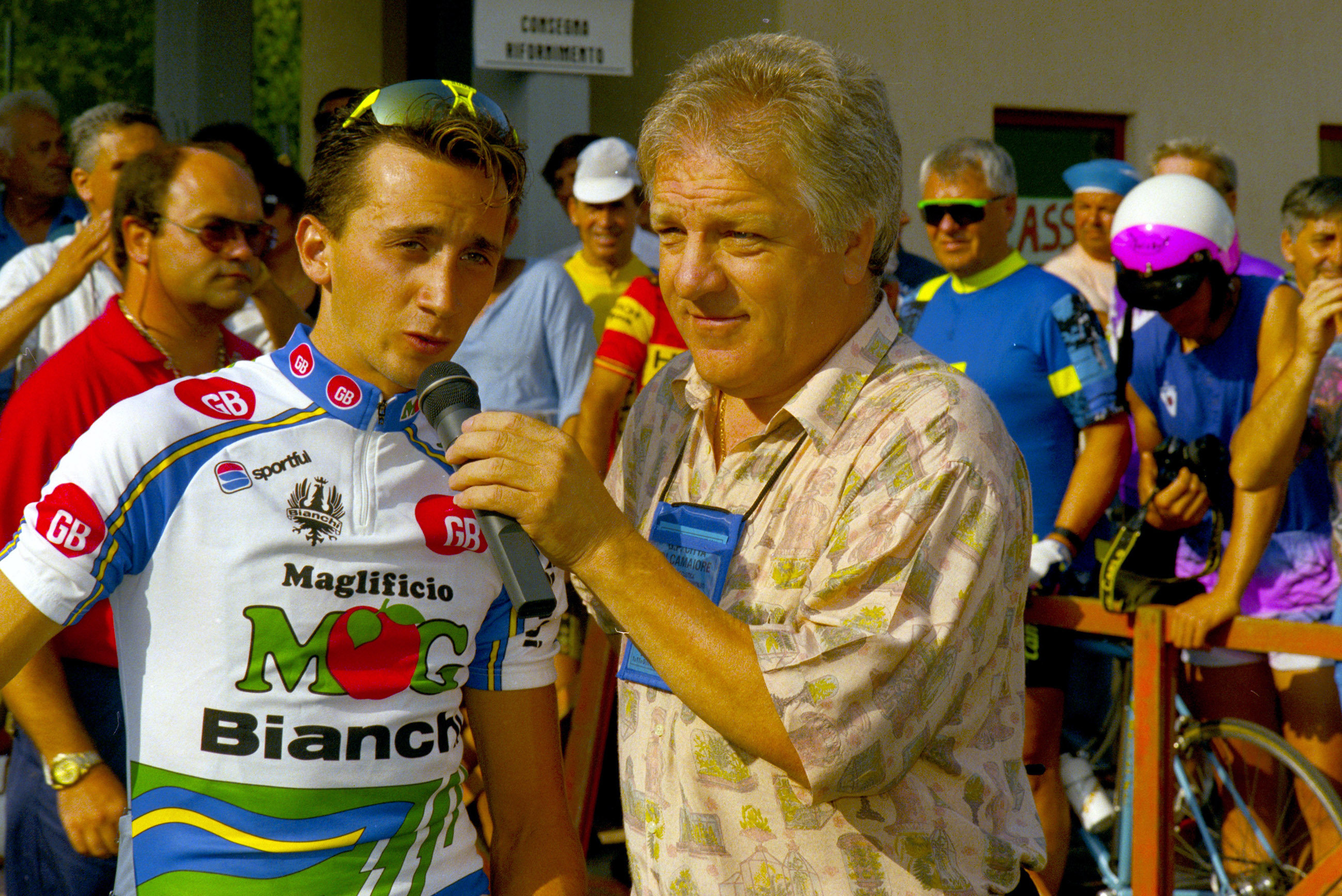
Wins at the Clásica San Sebastian and GP Zurich immediately after that Tour prompted Rebellin to divert his attention towards the Ardennes Classics and short stage races, and he would carve out a striking palmarès through his second stint at Polti and later spells at Liquigas and Gerolsteiner.
The zenith came in April 2004, when he won Amstel Gold Race, Flèche Wallonne and Liège-Bastogne-Liège in the space of a week, earning the moniker ‘Trebellin’. Yet even then, there was a sense that Rebellin sat somewhat askew amid the furniture of Italian cycling. His understated style meant he had already been routinely overshadowed by the era’s box office stars, and that same introverted nature perhaps also prevented him from asserting himself in the national team, where first Bartoli and later Paolo Bettini served as more obvious focal points.
Previously omitted from the Sydney Olympics in favour of a jaded Pantani, Rebellin was again left out when Bettini took gold in Athens in 2004. It was already clear he would be surplus to national coach Franco Ballerini’s requirements for that year’s Worlds, which prompted Rebellin to take the extreme measure of seeking Argentinean citizenship just to compete on home roads in Verona, a stone’s throw from his birthplace of San Bonifacio.
Two weeks before the Worlds, Rebellin went to Buenos Aires to complete the paperwork, even holding a press conference for the local press, but the application wasn’t processed in time and the UCI never signed off on the switch. Once again, he was left kicking his heels on the sidelines. His face never quite seemed to fit, not even at his home Worlds.
“Diadora had already made up an Argentinean kit for me to wear at those Worlds,” Rebellin says. “We waited and waited, but the passport never came, and I couldn’t ride.”
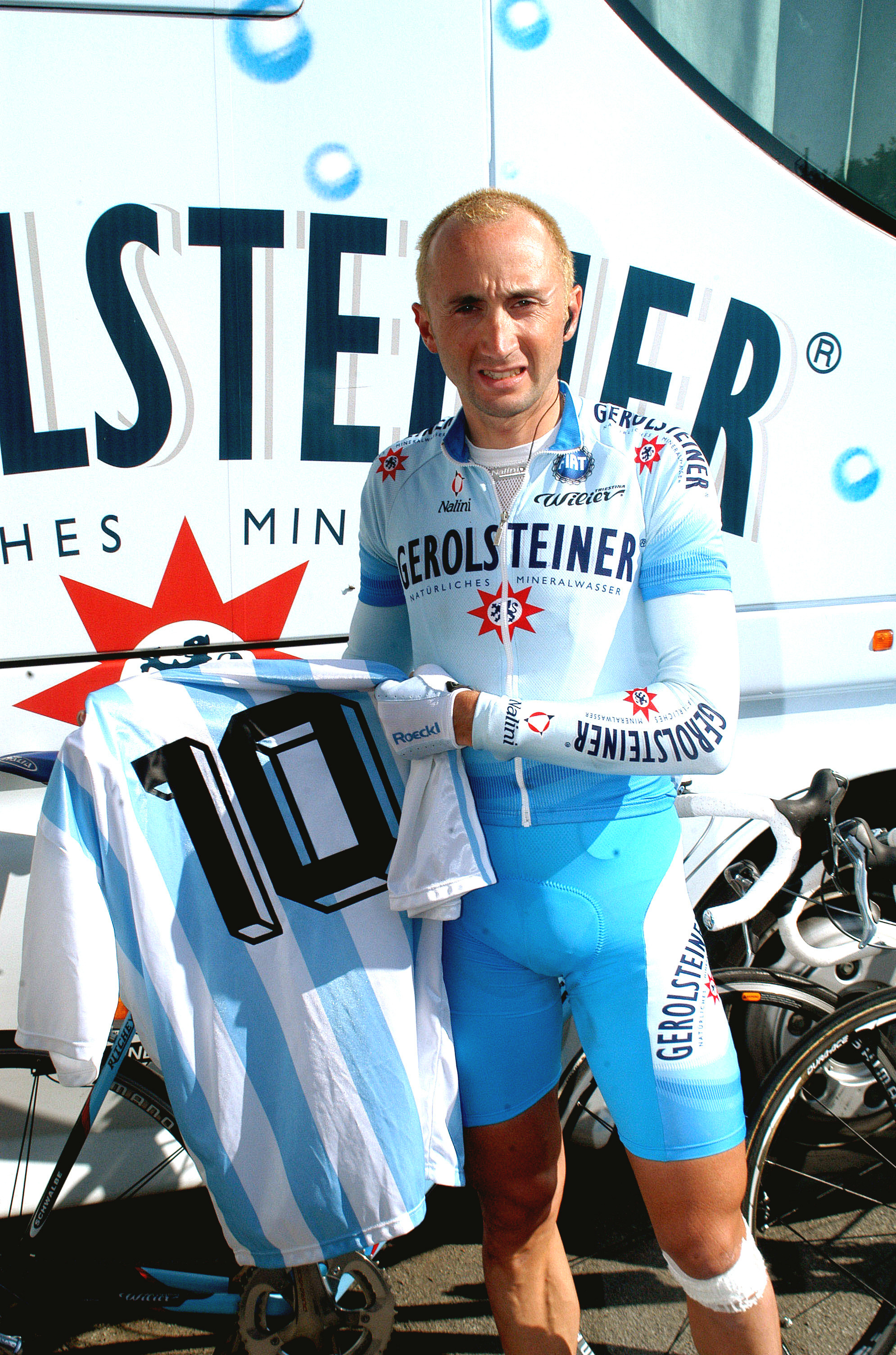
By the time of Rebellin’s Olympic silver medal in 2008, bridges with the squadra azzurra had been mended and the Argentinean affair long forgotten. In his late 30s, at an age when most contemporaries had already exited the stage, he somehow seemed to be still on an upward trajectory. After Beijing and the subsequent collapse of Gerolsteiner, he dropped down a division to join Androni but simply kept on winning, seemingly unaware of the sword of Damocles dangling above him from the previous summer.
It couldn’t last. In April 2009, barely a week after overwhelming Andy Schleck on the Mur de Huy to win Flèche, news of Rebellin’s positive test in China finally broke. His denials, always destined to be met with derision, lost even more credibility when video footage from 2001 confirming his links to the banned doctor Enrico Lazzaro entered the public domain around the same time.
I tried to change my personality, because I used to be a lot more closed. We could say this even strengthened me as a man.
Rebellin had fouled up and the shake-up that arrived wasn't limited to his doping suspension. His wife and agent, Selina Martinello, served as his spokesperson during those fraught early weeks in the eye of the storm, but the couple would divorce before his ban had run its course.
His tax affairs also came under scrutiny, with the Italian authorities suspecting Rebellin was spending rather more time in Padova than he was in his official residence in Monaco. Everything seemed to be crumbling at once. His reflex response to the crisis was to keep training as though nothing had happened, but he acknowledges that the period changed him. How could it not?
“It was a difficult moment: I also separated from my ex-wife, and that affected things too,” he says. “But I wanted to react to the situation as a man rather than as a cyclist. I tried to change my personality a bit, because I used to be a lot more closed, I didn’t really share my feelings. Now I was no longer fixated only on the bike, it opened me up more to life in general. We could say this even strengthened me as a man.”
The wilderness years
Rebellin would ultimately avoid a conviction for tax evasion, and he married his second wife, Fanfan, in 2014, but his cycling life was no longer where he had left it. While fellow convicted dopers like Ivan Basso, Danilo Di Luca and Riccardo Riccò had all found homes on WorldTour teams, there was no more room at the inn when Rebellin’s ban expired in early 2011.
It hardly helped that Rebellin was by then on the cusp of middle age, and he settled for a comeback at Continental level with Miche. Even though he won that year's Tre Valli Varesine a week past his 40th birthday, no top-flight team would touch him. He made it as far as Pro Continental level with CCC in 2013, but there were persistent murmurs that the Polish team’s Giro wildcard invitation was contingent on leaving Rebellin at home. He could come that far, but no further.
“Above all, I was hoping to be readmitted, to find the door still open, but that wasn’t the case, be it from some organisers or some team managers,” he says. “They all knew my value as an athlete, but I had this thing from the Olympics that closed the doors a bit. But I wouldn’t know how to explain it.”
Rebellin clearly sabotaged his own hopes at redemption, of course, with his steadfast refusal to confess to any wrongdoing or to make even the mildest show of repentance, which contrasted with Basso’s very public, though obviously incomplete, act of contrition after Operación Puerto.
The fact that Rebellin was the first – and still only – Italian athlete to be stripped of a medal at the Olympics was another obstacle. Perhaps an example had to be made. He says now that he would "like to be remembered as the rider who won Classics", but he knows that the fall-out from Beijing defines his career above all else.
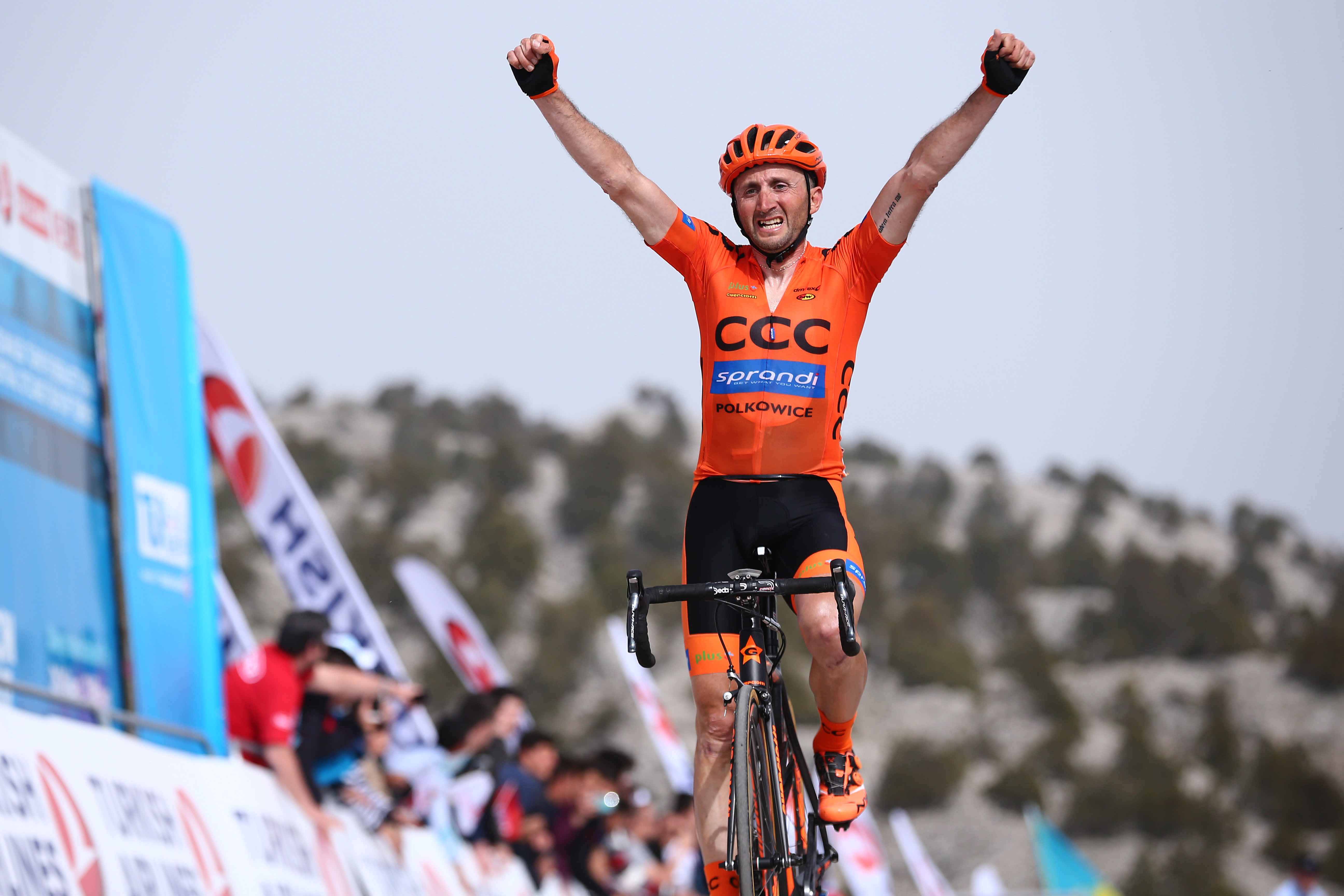
After CCC, Rebellin slipped down to Continental level again, first with the Kuwait-Cartucho team, then with Meridiana-Kamen, and finally with the Padova-based Work Service squad. While he was racing in Iran and Indonesia, his former peers were by now managing teams or pontificating on television coverage.
That kind of double standard proved too much for Floyd Landis when he was locked out of the top level, and he did the sport some service with his denunciation of Lance Armstrong in 2010. Rebellin, by contrast, quietly insists that he never considered lashing out at the system that had rejected him.
“No, not really. Aside from not wanting to damage the teams I was riding on, it’s not in my character to be like that,” Rebellin says. “I prefer to look ahead instead of staying there driving myself mad thinking about the past. I preferred to look ahead and above all, show my value with my results.”
Even if I was on very small – and, in a certain sense, humiliating – teams, they did everything with a lot of heart, and that was beautiful.
And so, rather than tear the house down, Rebellin continued to loiter outside, occasionally pressing his face against the glass but never again crossing the threshold. Others were allowed back inside after a spell in Purgatory, even without full confessions or contrition. Rebellin, meanwhile, was consigned to Limbo, even if, for a time, he was in denial about that too.
“I always hoped to come back to the World Tour, at least until I left CCC,” says Rebellin, who won the Giro dell’Emilia in 2014 and the Coppa Agostoni a year later at the age of 44.
Yet even though Rebellin was persona non grata at the top table, cycling kept putting food on his plate, albeit in more meagre portions. His last victory came in Tabriz on the 2017 Tour of Iran, but he kept going for five more years – thanks, he says, to the lighter calendar of racing.
“Even if I was on very small – and, in a certain sense, humiliating – teams, they did everything with a lot of heart, and that was beautiful,” he says. “And they brought me to places I might never have visited, like Iran and Africa. That was fun.”
The final pedal strokes
Even now, in his retirement in Monaco, Rebellin’s earnings will still come from cycling, through his collaboration with Dynatek bikes and his role leading amateurs on training camps. He also speaks vaguely of “maybe following some young riders", and he’ll keep racing in gravel events next season.
Indeed, just last week, Rebellin lined out in the inaugural UCI Gravel World Championships. It was his first time to ride in an Italian jersey since he placed fourth at the Varese Worlds in 2008 just weeks after Beijing, though he downplays its significance. “It’s not like putting on the maglia azzurra for a Worlds road race,” he says. “I wasn’t selected by the national team, I qualified for the Worlds myself in the previous race. But in order to participate, I had to wear a jersey with ‘Italia’ written on it.”
At the Veneto Classic, Rebellin wore a Work Service jersey with a design that seemed to echo that of the infamous Gerolsteiner team. He survived in the front group until deep into the race, eventually losing ground on the last time up La Tisa and rolling into Bassano del Grappa just over four minutes down in 30th place.
“I wasn’t on the same level as the best, of course, but I was still good,” Rebellin said on crossing the line.
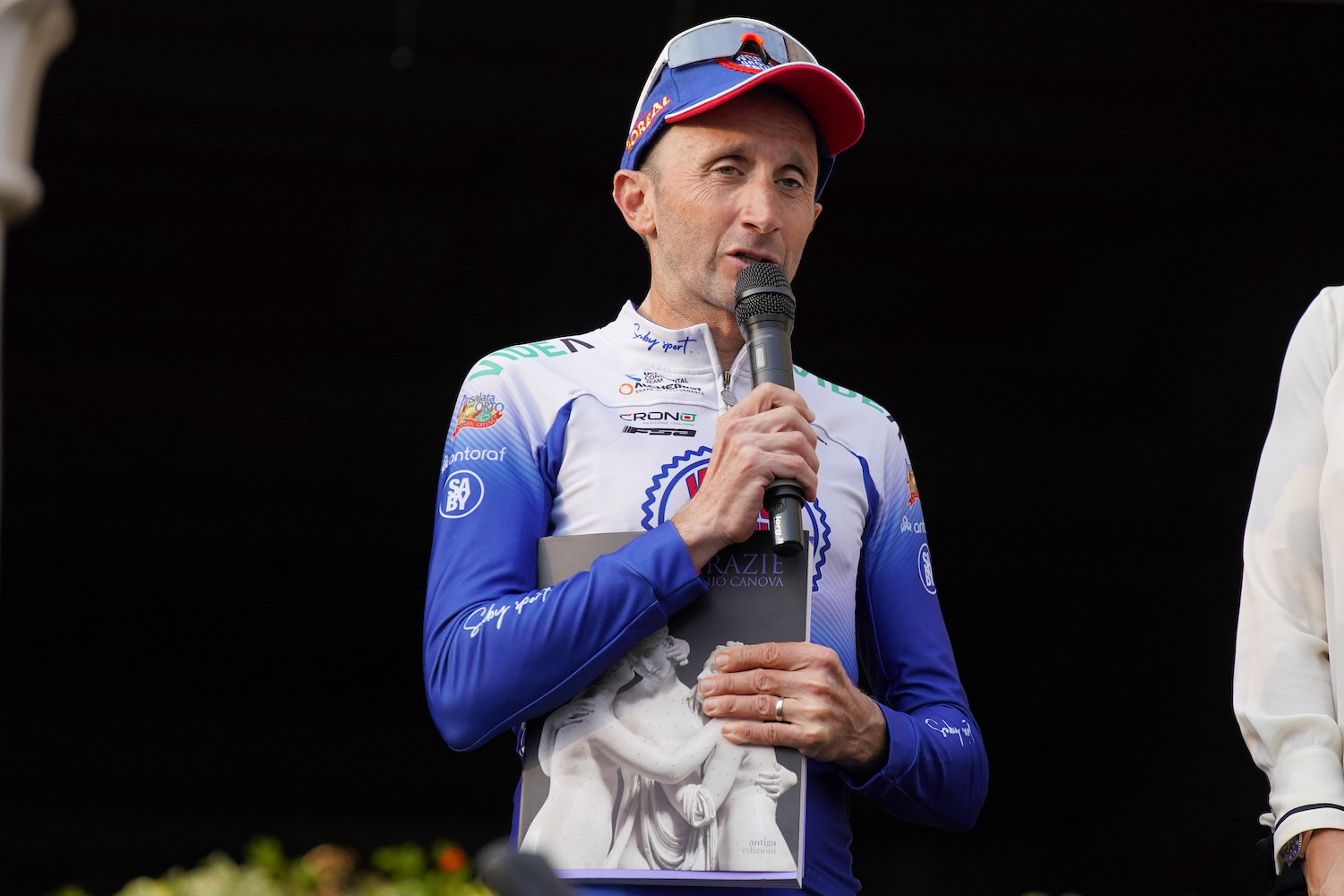
After the low-key acknowledgement on the start line, the veteran would receive a more formal send-off before the multitudes at the finish. Rebellin was feted on the podium before his home crowd, and even handed a microphone to issue a few words of thanks as he took his leave.
Time has a habit of softening a man’s image. Rebellin can’t erase his doping history, but in the last years of his career, his ongoing presence in the bunch began to be viewed with more curiosity or puzzlement than with disdain: "I didn’t keep going until 51 to set some kind of record. I did it because I felt like doing it. But now I think the right moment has come to stop.”
Just before making his way towards the podium on Sunday afternoon, meanwhile, Rebellin briefly found himself just a few yards from the man who was awarded that silver medal from Beijing. As he rolled to a halt on one side of the street, Fabian Cancellara stood on the other, present in the Veneto as owner of the ambitious Tudor team and guest of honour at the previous day’s Gran Fondo.
The moment seemed to pass unnoticed by both men. Rebellin went one way and Cancellara the other.

Barry Ryan was Head of Features at Cyclingnews. He has covered professional cycling since 2010, reporting from the Tour de France, Giro d’Italia and events from Argentina to Japan. His writing has appeared in The Independent, Procycling and Cycling Plus. He is the author of The Ascent: Sean Kelly, Stephen Roche and the Rise of Irish Cycling’s Golden Generation, published by Gill Books.